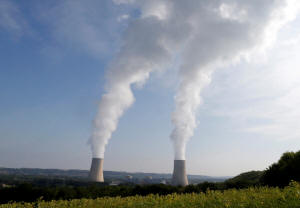U.S. nuclear industry group sees reprocessing as potential nuclear waste
fix
 Send a link to a friend
Send a link to a friend
 [November 17, 2020]
By Timothy Gardner [November 17, 2020]
By Timothy Gardner
WASHINGTON (Reuters) - The head of the top
U.S. nuclear power group said that reprocessing of nuclear waste, a
technique that has been banned since the 1970s on proliferation
concerns, has potential to help address a growing problem building up at
nuclear plants across the country.
"Reprocessing is a very interesting part of the solution set," Maria
Korsnick, the head of the Nuclear Energy Institute, said during an
interview last week that will be part of Reuters Events Energy
Transition North America https://reutersevents.com/events/energy-transition-north-america
on Friday. The technology "would be really closing the fuel cycle in a
very useful way" because it squeezes more energy from the waste that
cannot be used when it is disposed permanently.
France and other countries reprocess nuclear waste by breaking it down
into uranium and plutonium and reusing it to make new reactor fuel.

But nonproliferation experts say militants could target the reprocessing
supply chain, which would be far longer in the United States, to seize
materials that could be used to make a crude nuclear weapon.
Former President Jimmy Carter halted reprocessing in 1977, citing
proliferation concerns.
Now the United States has a growing problem with nuclear waste,
currently kept at the country's nuclear reactors, first in spent fuel
pools, and then in steel and concrete casks. While about $8 billion has
been spent on the Yucca Mountain permanent nuclear waste repository
project in Nevada, it has never opened due to local opposition.
President Donald Trump's administration wanted to open Yucca, but Trump
began opposing it in February as the presidential campaign got under
way.
Two sites in New Mexico and Texas could serve as interim nuclear waste
storage sites, but local concerns are mounting that those places could
become the default permanent fix.
Rita Baranwal, the top U.S. Energy Department official on nuclear power,
has said it is a shame to permanently dispose of nuclear waste and that
the country should look at reprocessing and potentially export the waste
to countries that could do it.
[to top of second column]
|

Cooling towers are seen near the Golfech nuclear plant on the border
of the Garonne River between Agen and Toulouse, France, August 29,
2019. REUTERS/Regis Duvignau/File Photo

Korsnick said the nuclear power industry is eager to work with the
incoming administration of President-elect Joe Biden on energy
issues including nuclear waste. Biden's transition website lists
driving down costs of advanced nuclear power and commercializing it
as one way to fight climate change.
Korsnick also applauded a decision this summer by the Development
Finance Corporation (DFC), a U.S. development agency, to lift a ban
on funding nuclear projects.
She said the move would help the United States compete with Russia
and China, which are also looking to export nuclear technology. The
export market for U.S. advanced nuclear power technology could be
worth up to $2 trillion, she said. The DFC's move was criticized by
some development experts who say bringing nuclear projects to poor
countries would do little to address poverty.
On reprocessing, France has demonstrated it can be done safely,
Korsnick said. "These are all conversations that we would have to
step through as we design our final solution," she said. "I'm
confident that we have the technological expertise to do this well."
(Reporting by Timothy Gardner in Washington; Editing by Matthew
Lewis)
[© 2020 Thomson Reuters. All rights
reserved.] Copyright 2020 Reuters. All rights reserved. This material may not be published,
broadcast, rewritten or redistributed.
Thompson Reuters is solely responsible for this content.
 |